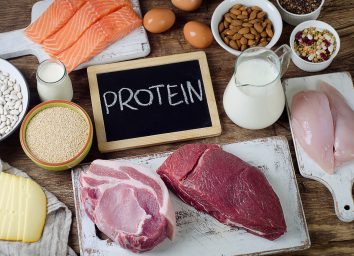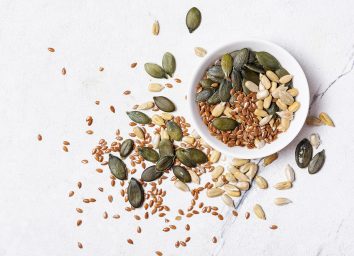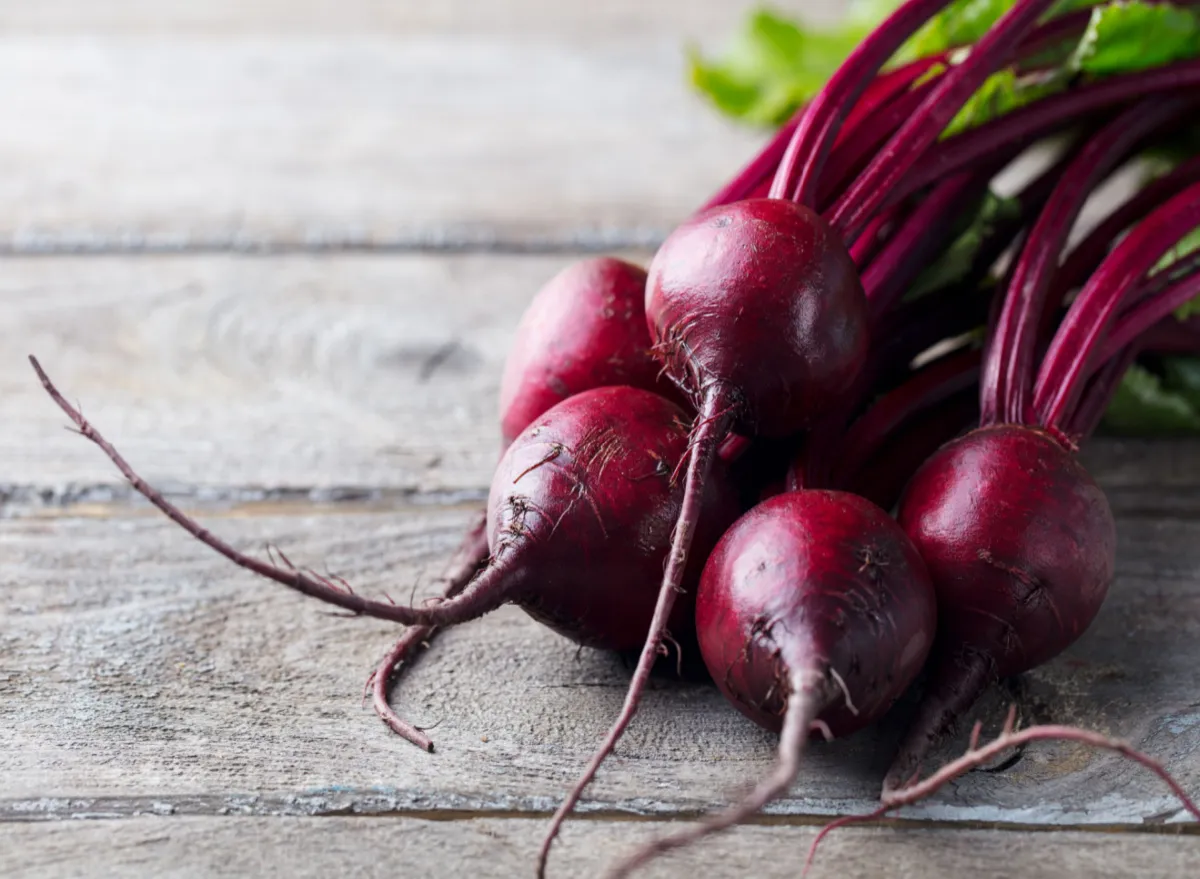
Beets are an earthy root vegetable that come in several varieties including a deep red, a yellow/orange hue, and white sugar beet varieties. The deep red beets are the most popular and are often found raw in the produce section, cooked in the refrigerated packaged goods section, or juiced. The root isn't the only part of the vegetable you can eat; beet greens are also edible and many people cook them down similar to collard greens.
No matter the variety, beets have a lot to offer for our health. They are high in potassium, nitrates, fiber, and antioxidants. Many experts believe that they are a powerhouse for blood flow in circulation, lowering inflammation, and detoxing pathways in the body.
Keep reading to find out exactly what happens to your body when you eat beets and some suggestions for including them in your diet. If you haven't typically liked the taste of beets in the past, you might even learn some new, tasty ways to eat them!
If you're looking for new ways to incorporate beets into your diet, consider this Beet, Arugula, and Peach Salad or one of these smoothie recipes! Read on, and for more, don't miss What Happens to Your Body When You Eat Potatoes.
Reduce blood pressure
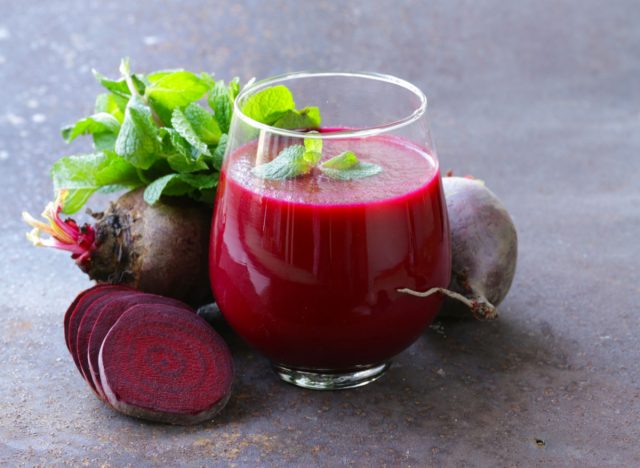
Beets have a very unique effect on blood pressure compared to other vegetables. Due to their potassium and nitrate content, they are particularly powerful for lowering blood pressure. We know that a diet high in plants increases potassium and lowers blood pressure. Nitrates are also known for expanding blood vessels in the body, also called vasodilation, which means our hearts don't have to work as hard to circulate blood flow.
Shannon Western, BSc., MSc., a registered nutritionist in the UK, and Founder of Ease Nutrition Therapy explains how beets have been shown to help blood pressure: "Beetroot has been found to reduce blood pressure in those who drink beetroot juice. This is due to the nitrates in beetroots. The impact of beetroot juice on blood pressure remains up to three months after stopping drinking it. Beetroot juice just allows more beetroot to be consumed in one serving."
Supports gut health
Beets contain specific fibers that feed the microbiome. We now know that these fibers act as prebiotics, which increase the amount and diversity of our good bacteria. In fact, some research shows that prebiotics may enhance the effect of probiotics—the "good bacteria"—on our gut health.
Anya Rosen, MS, RD, LD, IFNCP, CPT, a functional medicine practitioner and founder of Birchwell clinic, tells us why she recommends eating beets in her practice. "Beets are incredible for gut health. They contain compounds such as pectin and pectic-oligosaccharides that have been shown to benefit the gut microbiota, meaning that they nourish the 'good' bacteria. Other compounds found in beets, like betalains and phenolics, might boost short-chain fatty acids in the gut. This can reduce inflammation, strengthen the intestinal barrier, and more. Just don't freak out if they turn your poop red; that's due to the betacyanin," Rosen says.
Natural detox support
Beets support our natural detox pathway—our liver! Although some nutrition supplement companies would have you believe differently, our liver is quite capable of detoxing our bodies on its own. In fact, that's one of its primary functions.
However, that's not to say that diet can't play a role in supporting liver health and detoxing. We come across thousands of chemicals and molecules that can be harmful to us if they build up in the body. The liver can remove these harmful substances so that they don't get absorbed by the body.
Betalain is the nutrient in beets that is responsible for increased detox pathway support. Betalains increase glutathione production, which is an enzyme that naturally supports liver detox. Glutathione is a powerful enzyme that is being researched for everything from anti-aging to fatty liver disease.
Lower inflammation
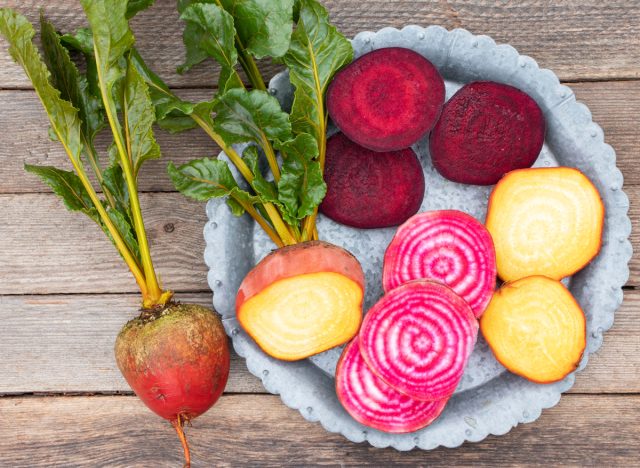
Beets are packed with antioxidants that help neutralize potentially harmful cells. Antioxidants have been shown to protect against cancerous cells.
Colorful fruits and vegetables are high in antioxidants. Each color represents a different class of anti-inflammatory compounds, each of which has its own function in the body.
Betaxanthins are a vibrant nutrient in gold or orange beets. This nutrient is part of a larger class of antioxidants called betalains. Betalains are known for lowering inflammation and helping fight oxidized cells that may be potentially harmful.
Regular digestion
With nearly four grams of fiber per cup of beets, you are well on your way to meeting the recommended amount of 25 grams of fiber per day. Beets contain soluble fiber, which helps increase bathroom regularity and prevent or manage constipation.
For digestion, this is huge. More fiber is associated with regular bathroom habits and preventing gastrointestinal disease and some cancers. Fiber also acts as a prebiotic which "feeds" the healthy bacteria in our intestines.
Increased circulation
You might find professional athletes touting their beet juice after their workouts. This is because the benefits of increased circulation help bring blood flow to the muscles that need repair after heavy training sessions. The nitrates in beets are responsible for the increased blood flow and its benefits.
Registered dietitian Mandy Tyler, M.Ed., RD, CSSD, LD describes how nitrates improve our circulation: "Beets are a source of nitrates, which are converted into nitric oxide in the body. Nitric oxide affects vasodilation, or increased blood flow, and bronchodilation, which makes breathing easier. For athletes and active individuals increased blood flow to working muscles can provide a performance advantage. The key is consuming enough dietary nitrate to get these positive effects, which is why concentrated forms, such as beet juice or beet shots are consumed," Tyler says.

